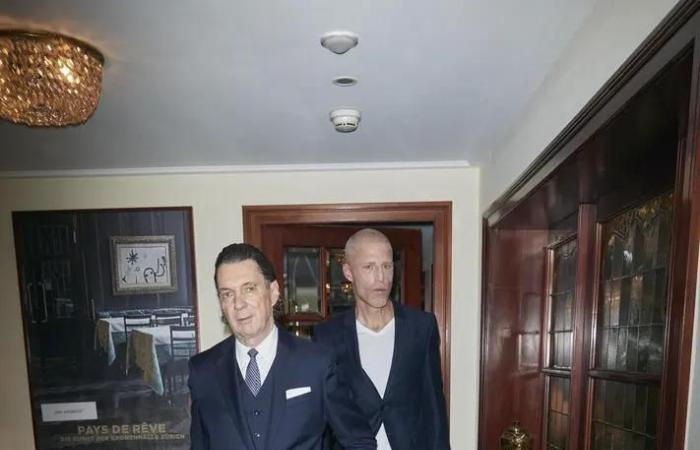Martin Suter and Benjamin from Stuckrad-Barre –
He like that, then he like that, then him again
The successful authors talk about banalities – and turn them into a book. They fail to go deeper when it becomes painful. Do you have to be there?
Christiane Lutz
Published today at 11:26 am
Martin Suter (left) and Benjamin von Stuckrad-Barre have a lot to say to each other.
Photo: Joel Hunn (Diogenes)
Subscribe now and benefit from the read-aloud function.
BotTalk
- Stuckrad-Barre and Martin Suter are publishing a new book of conversations entitled “No reason to shout like that”.
- The book project offers more banter than deep debate.
- Private topics such as grief are treated with humor, but superficially.
It’s Stucki weeks again on Instagram. They are always when Benjamin von Stuckrad-Barre has a new book and therefore himself to promote. This time it is “No reason to shout like that”, a conversation book by Stuckrad-Barre and Martin Suter.
Here you will find additional external content. If you agree that cookies are set by external providers and personal data is thereby transmitted to external providers, you can allow all cookies and display external content directly.
Allow cookiesMore info
It started when Stuckrad-Barre called for the book title to be smeared on the gigantic photo of himself and Suter at the Diogenes Publishing stand during the Frankfurt Book Fair and to post the result. In the last few days, semi-celebrities and celebrities posted a short video in which they performed, read, shouted and whispered the title of the book, i.e. “No reason to shout like that”. What these videos mean is clear: Look who our friends are.
But what this campaign also says: Anyone who allows such a prominent digital carpet to be rolled out either has a really good product to market or they don’t. Or, third possibility, he doesn’t dare go outside without this entourage.
The dance around Stuckrad-Barre’s vanity
In the case of Benjamin von Stuckrad-Barre, he makes no secret of his self-doubts and abysses; he wrote a whole book about it called “Panikherz”. This is also part of a production, but ultimately it is probably believable. It can therefore be assumed that this annoying, penetrating attention game, this digital name-dropping, functions as a lubricant for his self-portrayal.
You first have to get as many people, probably without having read the book, to confidently shout out its title on the Internet. So far, so legitimate. Still, it’s strange why everyone takes part in this dance around his vanity.
You learn what you never wanted to know and therefore never forget
In case of Stuckrad-Barres self-congratulation disguised as a “Me Too” novel “Still awake?”as well as already Hinz and Kunz uploaded such videosone could possibly accuse individuals of making themselves part of a questionable campaign. This time there is no danger, “No reason to shout like that” is a product that is as unsuspicious as possible.
It is the second part of a conversation between Benjamin von Stuckrad-Barre and Martin Suter, which had actually already been exhausted in the first part, “Everyone has become so serious” (2020). However, the concept can be expanded to an endless number of volumes and is therefore economically ingenious.
On a cue, the two start associating, usually in hotels or at Martin Suter’s home in Zurich. It’s about flowers, housekeeping, piercings, robotic lawnmowers, usernames, camping. Love, vanity, health. And that’s all.
Martin Suter doesn’t dye his hair, Stuckrad-Barre would like to be a lawnmower robot.
Photo: Maurice Haas (Diogenes)
You learn what you never wanted to know, but that’s exactly why you can probably never forget it: Stuckrad-Barre prefers the sunflower to the rose – “the stupidest flower”. Martin Suter doesn’t dye his hair. Stuckrad-Barre would like to be a lawnmower robot, and Martin Suter once had an earring. So they chat, always a little too amused by their own originality. More banter than relevant debate. However, relevance was never claimed. The two of them would probably find that vain.
It’s not possible to be an artist without being vain
Speaking of which: There’s even a whole chapter about vanity. «Are you actually vain? “That’s what we’re both sometimes told,” Suter asks, touchingly cautious. In response, Stuckrad-Barre finds writers “with a message” to be vain, but also those who refuse interviews to be vain. Because the grand gesture of self-withdrawal only emphasizes one’s own supposed importance. Writers who behave politically are vain. Doing something is just as vain as not doing the same thing, and so on and so forth. In short: it’s not possible to be an artist without being vain.
Stuckrad-Barre’s trick is always the same: he refutes potential criticism by always formulating it himself first. And he is also aware of this: “This is exactly what my inner vanity consists of,” he says, “that I also expose my mistakes, my weakness and my failure in this way. My external vanity, on the other hand, is, from my perspective, really just preventing something worse from happening.” One could now ask how vain it is to publicly reflect on this kind of fragile vanity.
What they then fail to reflect on because of all their vanity reflections is the vanity of this book project itself. The assumption that their private bromance must be presented to a larger public in book form in exchange for money.
They turn away when it becomes painful
Just as they fail to go into depth. They always turn off exactly when it would be painful. Martin Suter’s wife Margrith Suter died unexpectedly almost two years ago; the two had been together for 45 years. Stuckrad-Barre naturally includes her name and her death in the conversation, and Suter provides information and speaks tenderly and touchingly about her. He talks about the miserable expressions of condolence, about how he can no longer listen to Billie Eilish because she loved them. And the trouble he has because he wants to take over her cell phone, but doesn’t know her Apple ID and therefore had to prove to Apple that she was dead and he was her husband. All these brutal, bizarre simultaneities of mourning.
When Suter says he speaks to his wife regularly, Stuckrad-Barre replies: “For me it’s the same with Helmut Dietl. I talk to him in my head constantly.” And, oh yes, his ashes should please be scattered “under the lemon tree by the pool at the Chateau Marmont,” the luxury hotel in Hollywood that plays such a big role in his life.
Stuckrad-Barre’s father also died this year, which he apparently only found out about indirectly after the funeral; his relationship with his father, he also says openly, was bad. This is bitter to read, especially because of Stuckrad-Barre’s own bitterness. They don’t dare to really get into the misery, so any potential deep drilling is resolved after two or three turns, usually with a joke. Humor is an excellent coping strategy, even when dealing with sadness, but it is the only one here.
The question remains whether this is all worth reading. Let’s put it this way: The two men obviously have a lot to say to each other, they like each other, which is nice for them, and even entertaining for the readers at times. Because where there’s a lot of talking and Stuckrad-Barre mercilessly fires out one punchline after another, there’s one every few pages. So there are worse things.
Read and let read
Get reading tips and inspiration from our literary editor Nora Zukker.
More newsletters
Log in
Found an error? Report now.
0 comments







